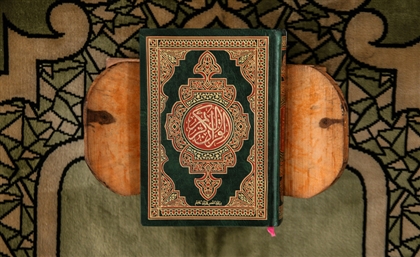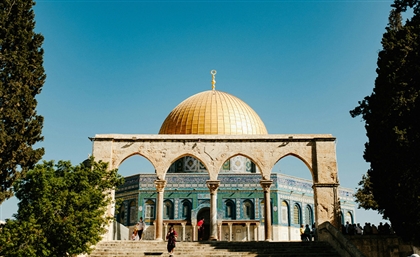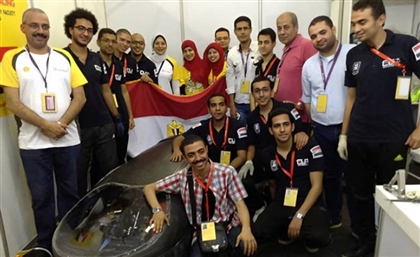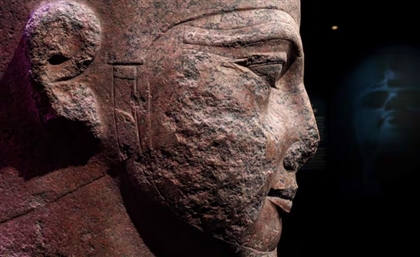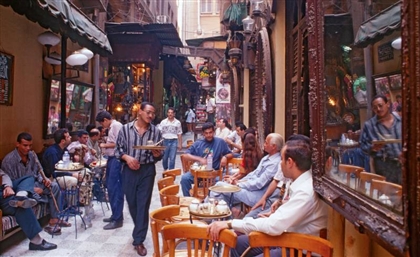The Roots of Medical School
In his Cairo Columnists debut, Habzyz III reminisces about his grandfather, Habzyz I, as well as his horrific memories of medical school at the University of Cairo.
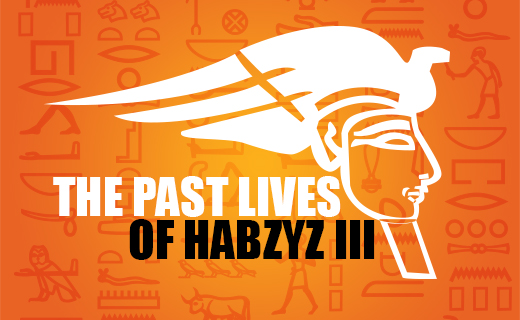
In a past life, I was an ashamed Egyptian, born abroad, unable to speak/read his native language. I remember visiting Egypt as a little boy, meeting all these people that were supposed to be my family and yet found myself unable to communicate with them. At the time, the only one in my family I could connect with was my gran-pappy Habzyz I. Even though his English was broken, I remember fondly the excitement I would get when he would come back from buying fruit. Upon hearing his return, I would quickly put on my bathing suit on and rush to the bathtub with a plate, awaiting for my grandfather to impart his wisdom and, more importantly, his recently purchased mangos. Apparently, they were just too juicy for me to eat in my clothes on, outside of a bathroom. Nevertheless, there I was in all my messy cuteness when my grandfather said something that would forever haunt me.
“It does not matter how crooked or how far the branches of a tree reach, they all have the same roots, and you should never forget that.”
These words would follow me through my childhood, and I felt that I was a branch that owed a lot to his roots. No matter where I was, every time I saw a great big old tree, yearning to touch the clouds, I was reminded of him. When he passed away, I was just finishing school, and trying to determine what to do next. I was so upset I wasn't able to make it to his funeral that I became determined to make it up to him, by returning to Egypt to learn more about my roots.

I applied to the University of Cairo, and was accepted to medical school. At the time of my acceptance, I was told that the programme was taught in English, which was a determining factor, as I did not know much Arabic. So, to my amazement, on day one, I found myself in front of a cadaver (a dead body), with an extremely angry and bald doctor, yelling at me to stick my hands into said body. After making fun of me in front of the whole class because I couldn't speak Arabic, he musters enough English to ask me to find the 'M'. After more jokes made at my expense, I decide to stick my hands into the body randomly, only to be informed that the 'M' is located near the armpit, and is the shape a bunch of arteries make when they split off into the arm. Maybe it was the sound of over a hundred kids laughing at me, or perhaps because I stuck my hand just about everywhere inside this body before I was shown where it was, but in that moment I realised I would need to learn Arabic
I started learning Arabic on my own. I began by finding movies and TV shows that I had memorised in English, but watched them in Arabic. I also began listening to Arabic love songs; El Doctora Kalthoum and El Bashmohandis Hafez were the best teachers, especially since they stretched out every word, making sure each syllable is heard. With my Arabic broken but my spirit undeterred, I returned to class and noticed that most of the students had large back packs full of bones they were studying from. I figured I would need some bones myself and asked around until I found out that a man could hook me up. I just needed to give him 150 pounds in return for all the bones in the body, in a secret deal behind the university.
In the sketchiest of fashions, we exchanged money for bones, and I was rather upset with my purchase as all the bones were kind of dirty. I took them home and dumped the bones in the bath tub. Every bone was accounted for and all of them needed to be cleaned. This was quite the departure from my mango days, and after submerging the skull, I realise the brain was still in it and all the bones now stunk with the rotten smell of death. It didn't occur to me that these were actual bones until that point, and now that all the bones smelled of death, no matter how much I cleaned them, I was forced to buy a new set. Upon further investigation, I found out that the sketchy man who had brought me the bones was actually a grave robber. Faced with the sobering reality, I opted not to buy a new set bones, but to borrow them from a friend if I needed them.
The information gap due to the language barrier was getting too much to bare, so after a bit of research I found a doctor who speaks English and would be willing to come to my home to tutor me in a language I could understand. The appointment was supposed to be for 7pm but in true Egyptian fashion, he didn't arrive until 10pm. I opened the door and was taken back by how bad he smelled. However, he greeted me in English, and in that moment I was reminded that beggars can't be choosers.
We sat down at the dining room table, and he asked me what I would like to start off with. I decide to start from the beginning and ask him to begin with the upper limbs. The doctor then reached into his duffle bag and, instead of pulling out the upper limbs text book, pulls out a complete arm and places it in front of me on my table. In a state of shock, I remind the doctor that I eat on this table, and remove the arm so that I could place some newspapers underneath. It turns out that his small duffle bag contains the whole body chopped into parts, based on the chapters. I admit there is no better way to study than from an actual cadaver, but at the same time, it is hard to focus amidst the stench of death. Come to think of it, that is probably why he smelt so bad, which was a bit of reassurance.
I asked him how he was able to obtain the body, as I prayed he didn't harvest it himself, and he explained that there is a black market that the university runs. Since in Islam it is haram to donate your body to science, he continued to explain that if you die in Egypt and you have no identification on you, the police send your body to the university where it's placed in a gigantic vat in the basement until it's needed. When there's a surplus of bodies, they're be sold to private doctors who would in turn use them as study aids.
The whole system was corrupt, and I couldn't help wonder whose head was literally in my hands. As the clock hit midnight, just like Cinderella, my doctor tells me he must go home. I agree and pay him handsomely, but to my surprise he tells me that he will be unable to take the body with him and asks to leave it in my home. I obviously refuse, as my bathroom already smells of death and now, so does my living room. After arguing about it, he promises to be back early in the morning to get it, as he knows he can't travel this late with a dead chopped up body without getting in trouble at a checkpoint. Before leaving, he tells me to leave the body under the dining room table, just as I prepared to leave it in the balcony. He tells me the sun will cook the body and will smell even worse if I don't keep it in so I agree, hoping that this will just be for a night.
Unfortunately, the doctor goes M.I.A. His phone is not working, and days are passing as my home fills with the unforgettable aroma. I become super angry and nervous, as I do not know how to properly dispose of a dead body without getting in trouble. After a week of not being able to eat or sleep in my home, and after naming the body Hanify, I start asking around for family members in the military. I find an uncle and explain to him my situation. He instructs me to leave the body in a garbage can outside of my home at fajr and he will send someone to take it off my hands. I rejoice at the prospect of having my home cleared of death, but out of nowhere, that afternoon, the doctor returns to my home, asking for it back. I debate whether to give it back to him, but after he begs and tells me how expensive it was to buy, I decide to give it back to him, in exchange for more lessons.
There are plenty of horror stories from my time in medical school. I spent almost three years before I decided to quit, amongst rumours that my school may no longer be accredited abroad. Even though medical school was the stuff of nightmares, I learnt Arabic, and felt that I accomplished the main goal of understanding my roots. What I didn't count on was learning about the surrounding soil, and after this life, I knew that I would never want to be buried in it.
- Previous Article I Got Banged!
- Next Article Nomades Land




